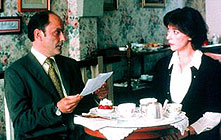|
|
|
|
The
Taste of Others
|
 |
|
In literal English, The Taste of Others sounds like the title of a movie about cannibalism. But Agnès Jaoui's film is about taste as in social and cultural sensibility, and it exhibits a sociologist's eye for the many ways in which individuals can be categorised – and, more importantly, categorise each other. Taste only really matters if there is an other against which to define oneself: somebody else whose choices in life are distastefully lowbrow or highbrow, coarser or more precious, under-educated or over-cultivated. Jaoui, with her collaborator and partner Jean-Pierre Bacri, show what the often abused and misunderstood genre of comedy of manners is really all about. Much of the film is devoted to a relaxed, patient examination of everything that comprises a character's manners in the social sense: what they eat or read, how they dress, whether they choose to watch television or attend theatre, and so on. The charm of the scenario slowly creeps up on viewers. We are introduced to a range of characters at various social levels: an actress, Clara (Anne Alvaro), who moonlights as a language teacher; a brusque businessman, Castella (Bacri) and his decorator wife, Angélique (Christiane Millet); a world weary barmaid, Manie (Jaoui); a bodyguard, Moreno (Gérard Lanvin) and a chauffeur, Deschamps (Alain Chabat), who sit about waiting for Castella. Gradually, these characters encounter each other: Castella hires Clara to teach him English (no easy task, as it turns out); Deschamps is served by Manie and abruptly reminded that he once had sex with her; and so on. The real drama of these meetings is in the fact that everyone is unsettled by another person's difference – with outright repulsion sometimes transforming itself, over time, into intrigue, need and even love. Jaoui and Bacri are a formidable team, both as writers and actors – their work best showcased in Alain Resnais' superb Same Old Song (1998). For her directorial debut, Jaoui confesses to having studied the complete works of Woody Allen. The influence of Allen's trademark style shows: simple, elegant scenes in which wide shots and long takes combine to highlight the interactions of the actors. But Jaoui surpasses Allen on one crucial level of content. Where Allen so often indulges and exploits a cruel condescension towards the taste of others, Jaoui maintains an admirably affectionate, compassionate, even-handed attitude. The Taste of Others was (like Same Old Song) an enormous popular hit in France. But Jaoui has found herself both blessed and cursed by this success. Just as her characters find themselves suspended between social classes, Jaoui's work falls between rigidly defined notions of commercial and arthouse cinema. Some critics have decried her hit as heralding a new form of safe, middlebrow, drawing-room comedy. Certainly, there is nothing overtly radical about this film. It sets out to entertain, to seduce, to insinuate, and it wholly succeeds. (Jaoui's subsequent directorial effort, Look at Me [Comme une image, 2004], is equally intelligently constructed, but far less ingratiating.) But in its content and approach to characters, it has already formulated a riposte to those cutting edge critics who, on principle, crave more provocative fare. For that, too, is a taste reflex – precisely the sort of closed-minded response to the variety of humanity (and art) that the film so subtly overturns and transcends. In its gentle wisdom, The Taste of Others brings a refreshing intelligence to character-based comedy. © Adrian Martin November 2001 |
![]()